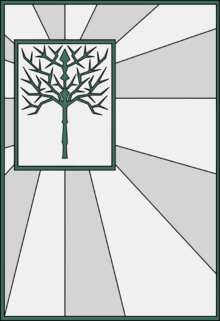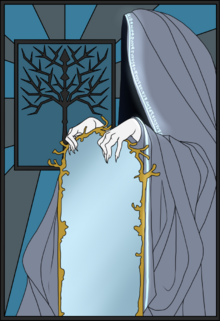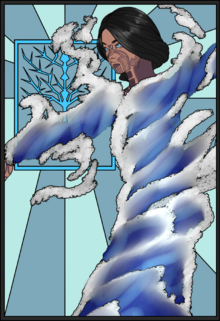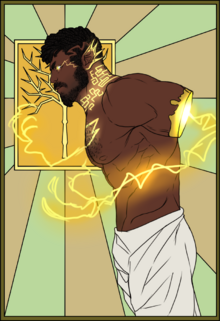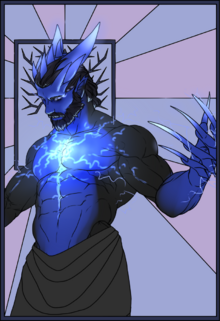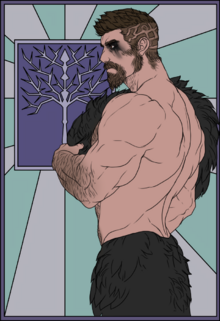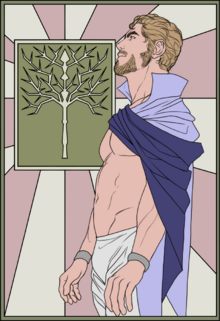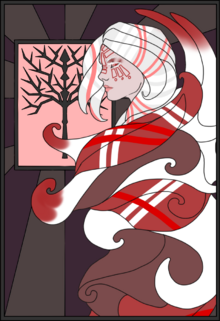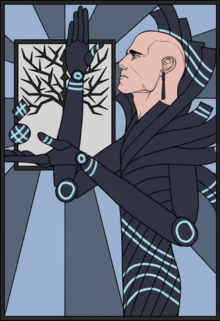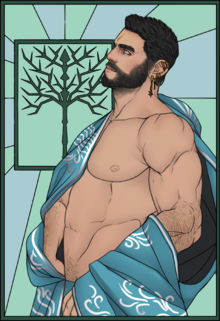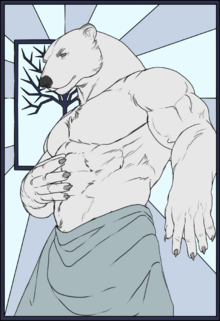More actions
No edit summary |
No edit summary |
||
| Line 92: | Line 92: | ||
Njal's shrines are usually mobile, meaning that they are carts or special harnesses that people have developed to strap onto themselves or move around. The idea is that Njal never sits still and must roam the land to see and experience more, and so his shrines should never stay in one place either, but rather see places. The act of worship to Njal is to say a prayer to his name, and then donate an alms or some sort of gift to an artist (even if the artist is not an Old Gods believer). This has resulted in Old Gods artists using a donation pot as a Njal shrine, and so when a Unionist tips them, they actually bring a prayer to Njal. Njal's cult is called Njal's Harps, who are known to reside in some of the major cities of Drixagh, hosting debauched feasts and parties with plenty of drinking and passionate exchanges. | Njal's shrines are usually mobile, meaning that they are carts or special harnesses that people have developed to strap onto themselves or move around. The idea is that Njal never sits still and must roam the land to see and experience more, and so his shrines should never stay in one place either, but rather see places. The act of worship to Njal is to say a prayer to his name, and then donate an alms or some sort of gift to an artist (even if the artist is not an Old Gods believer). This has resulted in Old Gods artists using a donation pot as a Njal shrine, and so when a Unionist tips them, they actually bring a prayer to Njal. Njal's cult is called Njal's Harps, who are known to reside in some of the major cities of Drixagh, hosting debauched feasts and parties with plenty of drinking and passionate exchanges. | ||
|} | |} | ||
===Gro, Shaper of Flesh=== | ===Gro, Shaper of Flesh=== | ||
{| | {| | ||
| Line 119: | Line 112: | ||
The Pantheon however demanded a very absent role in their worshiper's lives, and while Gro and Jord were popular, the other Gods in the pantheon did not permit them to interfere with the lives of the small people they had made. When Nelfin slavers appeared on proto-Velheim shores, the faithful were enslaved in the tens of thousands, and equal numbers died from warfare by the magically superior Nelfin. The Gods had agreed in conclave only to act in small doses, which never pleased Gro and Jord as it would not stave off a final demise of their people. Gro and Jord thus went in secret to the Great Betrayer, the King of Demons to the Old Gods worshipers, and struck a deal that condemned all Old Gods worshipers and the souls of their descendants to belong both to the Old Gods and the Great Betrayer. The Great Betrayer supposedly saved them from the Nelfin, but imprisoned them in 1000 years of hell. The other Old Gods expelled Gro and Jord, condemning them to wander the world where memory of them eventually faded after the Old Gods worshipers broke free from the Great Betrayer after a thousand years trapped, also condemning Gro and Jord for their betrayal. | The Pantheon however demanded a very absent role in their worshiper's lives, and while Gro and Jord were popular, the other Gods in the pantheon did not permit them to interfere with the lives of the small people they had made. When Nelfin slavers appeared on proto-Velheim shores, the faithful were enslaved in the tens of thousands, and equal numbers died from warfare by the magically superior Nelfin. The Gods had agreed in conclave only to act in small doses, which never pleased Gro and Jord as it would not stave off a final demise of their people. Gro and Jord thus went in secret to the Great Betrayer, the King of Demons to the Old Gods worshipers, and struck a deal that condemned all Old Gods worshipers and the souls of their descendants to belong both to the Old Gods and the Great Betrayer. The Great Betrayer supposedly saved them from the Nelfin, but imprisoned them in 1000 years of hell. The other Old Gods expelled Gro and Jord, condemning them to wander the world where memory of them eventually faded after the Old Gods worshipers broke free from the Great Betrayer after a thousand years trapped, also condemning Gro and Jord for their betrayal. | ||
|} | |||
===Halfvel, the Father of Demigods=== | |||
{| | |||
|[[File:Wolfgod.png|220px|thumb|left]] | |||
| | |||
*'''Identity:''' Halfvel, nicknamed the Father of Demigod and Wolf-God, was born when the mortal Berrin fell in love with Bard, King of Bears. | |||
*'''Themes:''' Halfvel does not represent any themes, but rather is the sole source of Demigodhood, blessing pregnant mothers with the Godspark, which can either be Mundane or Magic. | |||
*'''Depictions:''' Halfvel is always depicted with his Cloth of Godliness, in which it is said all Demigod children are born or laid to be found in the forest surrounded by Wolves. | |||
*'''Worship:''' Halfvel is worshiped by traveling the world, seeking out his children, and aiding them on the path of their divine purpose, whether they are Magical or Mundane. | |||
*'''Manifestation:''' Halfvel is often said to appear before mothers who pray intensely for purpose for their children, but is also said to disguise himself as a Wolf-man and birth Demigods among mortals. | |||
*'''Individual:''' There was once a Temple in Old Ceardia which supposedly housed Halfvel nearly all year round, however this place has not been visited since the destruction of Ceardia. | |||
*'''Worship House:''' Halfvel does not have any official Temples, however shrines dedicated to him are a wolf skull rested on several black wolf pelts, coins of gold inserted into its mouth for well wishes. | |||
*'''Other Notes:''' Halfvel's Demigod children supposedly have icy-blue eye-color, a high rarity among Ailor. Halfvel turns an unborn child or conceives each Demigod for a specific fate, some bad, some good. | |||
|} | |||
===Asbjørn, the Punished One=== | |||
{| | |||
|[[File:Asbear.png|220px|thumb|left]] | |||
| | |||
*'''Identity:''' Asbjørn, nicknamed the Punished One, (prior Berrin, a mortal) was made God when he committed a crime by falling in love with Bard, God of Bears, forced to bear a curse. | |||
*'''Themes:''' Asbjørn's themes are punishment, service, restitution, justice, seeking forgiveness, and taking responsibilities for one's crimes and wrongdoings in the eyes of society. | |||
*'''Depictions:''' Asbjørn is always depicted as a white bear, usually in chains, but often also in a resting pose. There is always a dubiousness to him, as if his godhood may not be a curse. | |||
*'''Worship:''' Asbjørn isn't strictly worshiped, but rather invoked when someone should submit themselves to punishment to make up for their wrongdoings, and he gives them strength to bear it. | |||
*'''Manifestation:''' Asbjørn has occasionally appeared, when a prisoner collapses under their punishment, or someone who is seeking forgiveness is about to give up, giving them strength once more. | |||
*'''Individual:''' Asbjørn only ever helps individuals, but he seems quite jovial for someone who is being cursed, some speculate that he is actually quite devious, and was cursed on purpose. | |||
*'''Worship House:''' Asbjørn's largest and most important Temple is the Ice-Crag Hall in Hedryll, a temple where docile polar bears roam, though it has recently fallen in disrepair by Vampires. | |||
*'''Other Notes:''' Asbjørn is sometimes somewhat dubiously treated because it unclear if he genuinely wants to help those seeking restitution through punishment, or is just using them to get to Bard. | |||
|} | |} | ||
===Frode, Carer of Nature=== | ===Frode, Carer of Nature=== | ||
| Line 124: | Line 143: | ||
===Toke, Lirh of Wilde=== | ===Toke, Lirh of Wilde=== | ||
TBD | TBD | ||
===Liv, Beauty of Fire=== | |||
TBD | |||
===Estrid, Queen of Battle=== | |||
TBD | |||
===Hagen, Father of Time=== | |||
TBD | |||
===Tove, Daughter of Dreams=== | |||
TBD | |||
==Trivia== | ==Trivia== | ||
{{Religion}} | {{Religion}} | ||
{{Accreditation | {{Accreditation | ||
Revision as of 04:10, 13 August 2022
| Fornoss | |
|---|---|
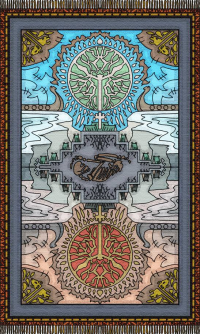 | |
| Religion | |
| Pronunciation | Old-Gods |
| Origins | Old Ceardia |
| Deities | |
| TBD | |
Origins
The origins of the Old Gods religion are somewhat murky, because of intensely conflicting versions. Old Gods as a religion has always lacked an organized hierarchy, and so local communities as well as diasporas do not agree on a common origin tale. While many Regalians consider Old Gods synonymous with the Velheim culture, they actually are not, and there are more Ceardians who worship Old Gods under the Cellik variant than there are Velheim Old Gods worshipers. Old Gods reaches beyond these cultures however, with Zvorun, Tarkkin and Dunbrae all having slight variations on the same ideology. All Old Gods worshipers agree that their faith started on the island of Yervonth (called Jerl in old Velheim) however they all disagree with what happened after. Cellik and Velheim Old Gods however are the two largest denominations controlling around 80% of the total worshiper population, and as such, their version is generally accepted as common dogma. Cellik and Velheim Old Gods doctrine claims that when the menace from the west (Nelfin slavers) arrived on the shores of Ceardia, that a group of Pagan Gods created a pantheon together and spirited large communities away from the Ceardian continent, harboring them in safety on the Yervonth island. From here, Old Gods would continue to spread over the world with migration waves, however the further they went, the more their doctrine was changed by local variations and changes. Unlike Unionism, Old Gods never underwent any major cataclysmic changes or schisms. As such, this page will treat the average understanding of Old Gods as fact, though minor local variations like changing a God's name or patron identity is permissible.
Core Identity
Old Gods is a religion that developed out of the old concept of Ailor Paganism in Ceardia, which was a polytheistic religion with a theoretical infinite amount of gods. Old Gods as a religion reformed this principle, attaching itself to the tangible gods that the people could see and interact with, and then centralized religion to them. Old Gods as a religion is centered around the concepts of Honor of the Soul, which is similar to Asaredu, but not strictly bound to combat honor alone, rather to the purity of one's soul as understood through the lens of behavior, actions, and things said. Old Gods worshipers refer to the Honor of the Soul as Soldi. It is actually a common misconception to think that Old Gods worshipers refer to their own religion as Old Gods. This is incorrect, because the term Old Gods was used by Unionists to refer to the faith that was largely replaced in the Archipelago by Unionism. Old Gods is actually referred to as Sjelbyrd by Velheimers or Selbarad by Cellik Old Gods worshipers. Because Ailor kind however has so many varied cultures, and because so few of them still worship the Old Gods, the term Old Gods has simply become commonly used, even by Velheimers when they speak Common.
Tenets
- Bravery: Soldi is gained with bravery, to fight against foes that overwhelm and overpower, to seek out challenges that bring glory and honor to one's family name, and to generally not show cowardice. Soldi is lost by showing cowardice and shirking from one's duties. One must always accept challenges, even if they could result in death or infamy. One must always commit to one's decisions.
- Wroth: Soldi is not strictly gained by being mean or violent, but rather by the idea that one should never give up or simply let things happen that one does not want to happen. Inversely, Soldi is lost by simply being meek and weak and letting events transpire without affecting them. One must never shirk from duties, or show weakness when strength and power are demanded by the public eye.
- Pleasure: The matter of chasteness versus pleasure is not really a matter that demands any Soldi satisfaction. Old Gods worshipers just don't really believe in chastity. That being said, dishonesty and deceit to one's lovers and spouse(s) results in loss of Soldi. One must always remain honest and truthful to those who one spends their life with, and afford them respect as if they are gods themselves.
- Vengeful: Soldi is gained by settling scores, Soldi is lost by letting a vendetta or nemesis simply walk all over one's self. Old Gods worshipers declare Motsaga against a person to declare them their enemy with scores to settle. The Old Gods worshipers came up with the saying "An eye for an eye". If another person is not strong enough to settle their scores, one can offer to do it for them, for Soldi's sake.
- Greed: Soldi is not specifically gained or lost while being charitable or greedy, but Old Gods as a religion generally rewards those who attain and retain the power to seize what they want and be merciful with what they have, but shows little favor on those too weak to make their own destiny. Greed over finances is however not encouraged. Old God worshipers should put little value in money, and more in possessions.
- Honest: Soldi is lost with deceit and lying, though not specifically while withholding information. Old Gods religion has a concept of "white-lies", and only punishes those who tell lies for explicit personal gain or to prevent danger to self (which they must be brave to face). White lies are acceptable if they prevent someone else from losing Soldi, or make everyone happier and easier off in the long run.
- Pride: Soldi is gained when others are aware of how great a person is, and Soldi is lost if a person is forgettable and irrelevant in the scope of history. Old Gods worshipers should endeavor to make sure their skills and talents are always known to others. One should never have paintings or statues made of one's self however. Artistic vanity is considered taboo, one can only accept such gifts made by others.
- Respect: A very important aspect of Old Gods worship is the acknowledgement of respect. While one must be proud of one's self, one must always deeply respect the skills of others, and pay homage to those who are simply better (even if they deserve a challenge here and there). One should never ever pretend like even one's enemies have no qualities or respect worthy aspects about them and one must vocalize them without spite.
- Soldi: The most important aspect of Old Gods is Soldi, which is like a currency of Honor. There is no strict numerical minimum or maximum, but being accused of being without Soldi is the worst insult to levy against an Old Gods worshiper, one that they believe condemns their soul. When someone's Soldi is lost, it is possible for relatives or friends to try and reclaim Soldi for that person by attributing their deeds to them.
- Loyalty: A very important aspect of Old Gods is loyalty, which can mean loyalty to family, to lovers, to one's overlord, one's ruler, or just the gods. Vows of loyalty are taken very seriously, and breaking one is considered a great way to lose all Soldi instantly. In the Regalian context, this usually means loyalty to the Gods, but also loyalty to one's Duke or Emperor depending on one's position.
Beliefs
- Narrative: In Old Gods beliefs, the world is one giant proving grounds for all living things (even wild animals) to prove the value of their soul and prevent loss of Soldi until they die. While all living things are born with Soldi, the effects of evil causes them to commit sins. Sins causing a loss of Soldi are a person's soul showing weakness and thus not having the right to pass into the afterlife. Old Gods dictates that while bodies are made by the gods, and Dragons create a kindling of a soul, that ultimately a soul's development, nurturing, and aging, is entirely up to the person themselves. When a person dies and their soul has enough Soldi they pass into the afterlife or the Valley of Life, which is an idealized version of life with drinking, feasting, and fun. When a person who passes into the Valley of Life also has a hero or legendary status soul through some great achievement or fame in life, they go to the Valley of Legends, which is an upgraded version of this afterlife where their every whim is satisfied. In case a soul is deemed without Soldi, they are condemned to the Mirror world, where the soul wanders for eternity on the salt-flats without color, smell or sound as penance. It is said that some souls have such evil in their hears that they escape the Mirror world, and become Undead in the real world. This is why Old Gods worshipers have such a negative view of Undead who were Old Gods worshipers in a prior life, but are apathetic to Undead from other religions.
- Canon Evil: Canon Evil in Old Gods is called Demons, which takes similar origins as Unionism, but has a more flexible interpretation. On one hand, Old Gods worshipers do acknowledge Demons from the Void, Exist, and Bintaar as evil with corrupting intentions. They refer to them as Betrayers, with one particular Demon called The Great Betrayer being the worst, which scholars believe to be the Arken of Power. Demons seduce people into doing things that ruins their Soldi with promises of power, fame and legend. On the other hand, Old Gods worshipers acknowledge the evil in mortals as a far more realistic source of bad things in life. It is said that the Gods and Dragons made a pact, with the Gods making the bodies of Ailor-kind, and the Dragons providing the breath of life, which would create a seedling of a soul. However, as life develops, the person who the soul belongs to creates the expressions, actions and feelings of the soul themselves as it grows over time, and that evil is simply the person being too weak to hold onto virtues in life and engaging in sin. As such, evil can neatly be defined as either Demons inducing weakness in otherwise strong people, or weakness just existing in a soul because the person themselves are weak.
- Identity: Old Gods dogma has no explicit gender, sex, sexual orientation or gender-identity bias, though it has an implicit male-bias. While any Old Gods worshiper will claim that all genders and sexes are equally fair in their religion, traditional male-coded masculinity takes a unique place that discolors a lot of the nuance about gender. Strong, masculine and emotionless are framed as virtues for men living by the examples of their gods, and so Old Gods society can come across as publicly egalitarian, but having hidden masculine preferences under the surface.
- Conversion: Old Gods as a religion does not require preaching or spreading through missionaries, which is usually a practice reserved for Faith of Estel and Unionism, though to say it is without violent impression is false. Among Old Gods worshipers, holy wars can rage between two distinct populations over small denominational ideals (some as ridiculous as the believed hair color of a god), but bigger conflicts arise with other religions. Old Gods worshipers in general are very intolerant to other religions mostly born out of necessity, because disloyalty to the gods (for example by converting from Old Gods to Unionism) means a complete loss of Soldi and thus a soul being condemned to the Mirror world. Old Gods worshipers have been known to force their faith at the end of a sword and axe, especially in the far north where they are in the majority. Old Gods worshipers also frequently deface religious symbols of other faiths or engage in desecration of holy sites.
- Sins & Taboo: The worst cases of sinning and taboo for Old Gods are disloyalty to god, family and one's leaders, backstabbing, betrayal, deceit for greed's sake, and refusing a challenge of honor or duel of honor and abiding by cowardice. Never does a single sin or transgression cause Soldi to be lost fully, it is more like a currency that slowly leaks away, however repeat offenses do cause eventual loss of Soldi altogether. Old Gods does not really have a central body of priests to condemn a person, but generally speaking, Old Gods communities have a very communal sense of expelling a member when they believe their Soldi to be too far gone.
Gods and Goddesses
TBD
Arne, Father of All
Bev, Mirror of Life
Hel, Dancer of Death
Adal, Prince of Forgiving
Odal, Prince of Vengeance
Bard, King of Bears
Njal, Prince of Art
Gro, Shaper of Flesh
Jord, Forger of Metal
Halfvel, the Father of Demigods
Asbjørn, the Punished One
Frode, Carer of Nature
TBD
Toke, Lirh of Wilde
TBD
Liv, Beauty of Fire
TBD
Estrid, Queen of Battle
TBD
Hagen, Father of Time
TBD
Tove, Daughter of Dreams
TBD
Trivia
| ||||||||||
| Accreditation | |||||
|---|---|---|---|---|---|
|
| ||||
